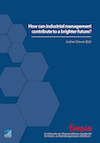Search


Bibtex
Cite as text
@Book{Deuse,
Cite-key = "Deuse2023_WGAB",
Year= "2023",
Volume= "Schriftenreihe der Wissenschaftlichen Gesellschaft für Arbeits- und Betriebsorganisation (WGAB) e.V.",
Journal = "WGAB",
Title= "How can industrial management contribute to a brighter future?",
Author= "Jochen {Deuse} (Ed.)",
Doi= "https://doi.org/10.30844/wgab_2023",
Abstract= "Industrial management has many opportunities to contribute to the future with one of the most important being promoting sustainability. By adopting sustainable practices, industrial management can help reduce waste and pollution, conserve natural resources and protect the environment. Industrial management can help workers acquire new skills and knowledge by providing employees with training and development opportunities that will enable them to succeed in the future. This not only benefits workers but also helps companies attract and retain top talent, which in turn can assist to better address current and future challenges.
This year, the WGAB follows the motto "How can Industrial Management contribute to a brighter future?" in order to address the global requirements for climate protection and the associated three pillars of sustainability - economy, ecology and social issues - through technical approaches.
Thanks to the creativity and proficiency of this year's authors, this book contains a wide range of research approaches and methods that contribute in line with this motto. It covers research fields of maintenance-free and resilient production, material flow planning as a model for public transport, circular economy networks, employee management and planning. Additionally, new approaches and integrated digital twins for mapping product life phases are also presented.",
Keywords= "WGAB2023, Industrial Management",
}
Jochen {Deuse} (Ed.)(2023): How can industrial management contribute to a brighter future?. Schriftenreihe der Wissenschaftlichen Gesellschaft für Arbeits- und Betriebsorganisation (WGAB) e.V.(2023)Online: https://doi.org/10.30844/wgab_2023 (Abgerufen 22.10.24)
Open Access
Abstract
Abstract
Industrial management has many opportunities to contribute to the future with one of the most important being promoting sustainability. By adopting sustainable practices, industrial management can help reduce waste and pollution, conserve natural resources and protect the environment. Industrial management can help workers acquire new skills and knowledge by providing employees with training and development opportunities that will enable them to succeed in the future. This not only benefits workers but also helps companies attract and retain top talent, which in turn can assist to better address current and future challenges. This year, the WGAB follows the motto "How can Industrial Management contribute to a brighter future?" in order to address the global requirements for climate protection and the associated three pillars of sustainability - economy, ecology and social issues - through technical approaches. Thanks to the creativity and proficiency of this year's authors, this book contains a wide range of research approaches and methods that contribute in line with this motto. It covers research fields of maintenance-free and resilient production, material flow planning as a model for public transport, circular economy networks, employee management and planning. Additionally, new approaches and integrated digital twins for mapping product life phases are also presented.
Keywords
Schlüsselwörter
WGAB2023, Industrial Management
References
Referenzen
Maintenance-Free Factory
Wilfried Sihn, Luisa Reichsthaler, Daniel Toth, Linus Kohl, Lisa Greimel
Fraunhofer Austria Research GmbH
https://doi.org/10.30844/wgab_2023_1
Conceptual Design of a Decision Support System for Material Flow Planning and its Transfer to Public Transport
Christoph Ecker, Matthias Hayek, Martin Riester, Wilfried Sihn
https://doi.org/10.30844/wgab_2023_2
MTM in Motion – Perspectives to digital work design
Peter Kuhlang, Martin Benter, Maria Neumann
https://doi.org/10.30844/wgab_2023_3
Fostering Circularity: Building a Local Community and Implementing Circular Processes
Jonah Schulz, Simon Hillnhagen, Matthias Schmidt
https://doi.org/10.30844/wgab_2023_4
Creative intent and reflective practices for reliable and performative human-AI systems
Uta Wilkens, Ambrose Field
https://doi.org/10.30844/wgab_2023_5
Smart, Sustainable and Socially Valuable: How Digital Textile Microfactories Can Contribute to a Brighter Future
Pouria Arfaiee, Marcus Winkler, Meike Tilebein
https://doi.org/10.30844/wgab_2023_6
Advancing medical resident scheduling
Alexander Gaal, Wolfgang Dummer, Thomas Sobottka, Fazel Ansari, Sebastian Schlund
https://doi.org/10.30844/wgab_2023_7
Navigating Ecosystem Virtuality – An Integrative Perspective on Digital and Colocated Collaboration for Innovation
Robert Rose, Valeska Maul, Katharina Hölzle, Wilhelm Bauer
https://doi.org/10.30844/wgab_2023_8
Increasing resilience in factories: the example of disturbance management
Norbert Gronau, Marcel Panzer, Jana Gonnermann-Müller
https://doi.org/10.30844/wgab_2023_9
Green Digital Twins in the product life cycle
Opportunities and challenges for sustainability engineering
Jochen Deuse, David Wagstyl, Victor Hernandez Moreno, Mikhail Polikarpov, René Wöstmann, Florian Hoffmann
https://doi.org/10.30844/wgab_2023_10

 English
English